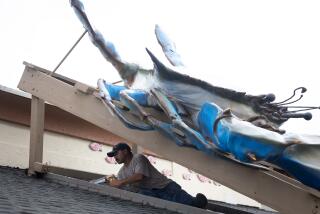Ike and Gustav swamped gulf seafood trade
- Share via
SAN LEON, TEXAS — On the eve of October’s peak seafood harvesting season, migrant fishermen are sweeping debris from gutted bay-side homes instead of scooping shrimp and oysters from the Gulf of Mexico’s lucrative floor. The $100-million fishing industry in Galveston Bay is nearly paralyzed.
Hurricane Ike’s effect is being felt among gulf seafood harvesters, distributors and restaurants. Government and industry officials fear it will take as long as two years for the processing plants, boats and docks along the bay to recover and rebuild.
“It’s like a bomb went off,” said Lisa Halili, owner of Prestige Oysters Inc., which is among the largest seafood harvesters in Texas and Louisiana.
Hurricanes Ike and Gustav hit the region’s fishermen hard, causing the industry to lose an estimated $300 million in Louisiana alone. The storms scattered debris in waterways, broke docks and smashed boats. They killed hundreds of acres of oyster reefs with waves of saltwater and suffocated others with grass clawed from the shore and washed into the gulf.
Hundreds of Galveston-area fishermen were left jobless, and they have few, if any, options, their employers said.
Texas restaurant owners are also feeling the effects. Seafood prices rose $2 to $3 a pound and shortages of shrimp, halibut and sea bass emerged after Ike, said Nafees Alam, vice president of Dallas Restaurant Group.
Menus aren’t changing, but South Prairie Oyster Bar owner Will Wickman said he hadn’t seen a gulf oyster at his suburban Fort Worth restaurant since Hurricane Gustav. His oysters now arrive from the Northwest, and customers pay as much as $3 more a dozen.
“And we’re not really making anything at that,” Wickman said. “But we’ve got to have oysters. It’s kind of like going into 7-Eleven -- you got to have the Big Gulp.”
Galveston Bay fishermen haul about 9 million pounds of gulf shrimp and 3 million pounds of oysters each year, said Lance Robinson, a coastal fisheries director with the Texas Department of Parks and Wildlife.
About 60% of oysters sold in the eastern U.S. come from Texas and Louisiana, the bulk from Galveston Bay. The U.S. consumes about 1.1 billion pounds of shrimp a year, according to the National Marine Fisheries Service.
Louisiana’s commercial fishermen have the largest haul in the lower 48 states at more than 450,000 tons a year, with the bulk of the landings made up of shrimp and menhaden, small fish used for fish meal. The state’s haul is worth about $270 million a year, and representatives of its $2.6-billion seafood industry are seeking federal relief.
Texas’ commercial haul -- much of it shrimp -- is valued at about $172 million and on par with many other states -- 38,200 tons to 53,100 tons a year.
Michael Ivic, who runs Misho’s Oyster Co. in San Leon with his father, is desperate to drive a boat out and comb a dredge along the floor to clean the oysters. He figures he has two weeks to save whatever reefs remain.
A week after Ike thundered into San Leon, two fishermen hauled debris from Misho’s marina because they need the plant running to get a paycheck, he said.
But the bay remained closed after Ike struck, and Ivic doesn’t even know which state agency to call to get the waters reopened to boats. Ivic said his company was a chief supplier to national restaurant chains Landry’s and Joe’s Crab Shack.
“We might lose them,” Ivic said.
Some fishermen who already tried salvaging whatever was left in the gulf say don’t bother. “Pictures and clothes down there,” said Juaquin Patila. “But there’s no more reef.”
Most fisherman make $100 to $150 a day working in the marinas in San Leon, with hundreds of migrants with work visas arriving between the peak harvesting months of October and April. Their trailers, like their jobs, are gone.
Wearing rubber fishing boots and a shirt stained by oyster meat, Martin Duran looked like he was headed to the docks just as he’s done for 12 years in San Leon. Instead, he was going to clean houses battered by Ike, the only work he could find.
“I’ve got no job, no paycheck,” said Duran, who has four children. “I don’t know what’s going to happen here.”
More to Read
Sign up for Essential California
The most important California stories and recommendations in your inbox every morning.
You may occasionally receive promotional content from the Los Angeles Times.










